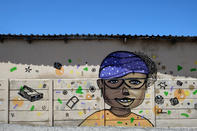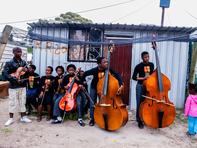A Township Tour Story
Is a township tour in South Africa merely a way to be a voyeur of poverty? Carrie Hampton reflects on how a township tour in Cape Town left her with humility and a sense of ubuntu.
Township Dignity
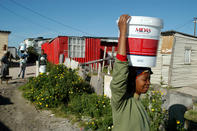
Nombasa Sono stands tall and dignified with a smile spread right across her face as she warmly greets the minibus of European tourists. She is our escort into the labyrinth of shacks that make up the Joe Slovo informal settlement, a more PC name for 'township'. Gucci shoes that only a short while ago trod plush carpets of Cape Town's hotels, now pick their way through grey sand scattered with broken bottles and wooden debris. These are the remains of shacks that burned down in a fire that swept through the settlement just a few weeks ago.
Nombasa's marital hut was undamaged and with pride, she leads us to it through tight passageways in between rickety dwellings. We are like pied pipers with a following of children growing ever larger the further we go. Tiny hands take a firm grip and lead us deeper into this place that feels so unfamiliar.
Nombasa is immaculately dressed according to her status as a newly married woman; long skirt, neatly pressed pinafore, long sleeves and a head wrap tied at the front. She would sometimes wear jeans if she didn't have such a strict mother in law, who would consider it disrespectful if she wore such common clothes.
Nombasa is house proud of her one-room shack; spotlessly clean with neatly stacked kitchen equipment and walls lined with cardboard for insulation, decorated with glinting green confectionary wrappings. There is no bathroom or running water and toilets are communal. Nombasa's elegance and grace turned condescending emotions of pity and sympathy into humbleness that made us appreciate the amenities we take so much for granted.
Welcoming Residents
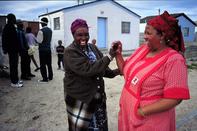
The question in everyone's mind was "are we imposing" and "how do the locals feel about us coming here"? Our tour guide Thandis said that this worries just about every township tourist. He refused to answer and directed us onto the streets of Langa for us to find out for ourselves if we were intruding.
We were answered with; "We like you here." "Come and visit us again." "Take my picture." Digital cameras clicked furiously and caused great hoots of laughter as locals stared at their own image. Even the menacingly cool dudes wearing dark glasses, cracked their expressionless faces into a broad grin when they saw their photograph.
Other responses to the questioning of a pale-faced group of tourists on a South African holiday was; "You bring me jobs." "You make me rich." Township tourism certainly does uplift communities and individuals. Sometimes it is immediate with a R100 note slipped into a handshake as a tip to the guide, and sometimes it's over a longer-term as with Rosie, who runs a feeding scheme in Khayelitsha township. A wealthy tourist was so taken with Rosie's dedication to feed undernourished children and inform them about HIV and AIDS, that he now donates a monthly sum to keep her going.
Sheep Head Delicacy
During our Langa walkabout, we met Patricia, whose roadside business turned a few delicate western stomachs. She trades in sheep heads. Patricia sells cooked whole heads at R25 and half-heads at R12.50. Her sheep heads have tongues, which keeps her customers happy but means she needs to leave her house before 6 am to get to the butcher first. Amid the flaming fires that scorch the wool from the head, and the boiling vats that left her arm scalded the previous week, Patricia stands out as being superior to her grimy surroundings.
She speaks eloquently in perfect English and has a good business head on her shoulders. Why then does she and her six lady helpers only manage a salary of about R30 per day? She says it's because she can't put up the prices as people are too poor to pay more. In the townships, they share their poverty.
A Tight-Knit Community
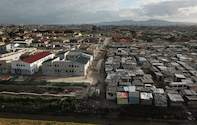
Even the area's more wealthy residents remain in the township. They live in 'Beverly Hills'; a street of solid brick houses with metal gated yards only metres from the shacks of Joe Slovo and the overcrowded hostels of Langa. These residents are a decent salary away from shack and hostel life that is reduced to one family, one room, one bed. We asked our guide Thandis if he lived in Beverly Hills and he laughed saying "One day I hope to. First I must put two of my brothers through school then university. After that, I will move to Beverly Hills."
We saw another side of Langa life down a dirty alley known for its shabeens (illegal drinking dens). Daily membership of Mum Qwathi's shabeen only costs R5 for all you can drink. Enamel jugs froth at the brim with umqombothi beer brewed from maize and sorghum. The jug gets passed around from mouth to mouth and it was obvious some participants had imbibed more than their 5 Rand's worth.
Unaccustomed to the dark surroundings, we sat quietly and sipped the muddy beer cautiously. But the locals were having none of our reticence and decided we should sing, dance and drink some more. So we clapped and danced clumsily in the pursuit of fun and the spirit of ubuntu. The word Ubuntu encompasses a whole philosophy of morality and humaneness, communal responsibility and solidarity.
Sitting on the rickety benches in the soot-filled room, getting to know the locals, we felt a kind of unfamiliar heart-warming camaraderie. Rich rubbed shoulders with poor in an atmosphere of mutual respect and shared curiosity. Strangely, we didn't want to leave; we were just getting the hang of township life.
The hotels of Cape Town full of visitors on their South African holidays and the hostels of Langa seemed worlds apart, rather than 15 minutes drive away, but we learned some lessons that day in the streets of Langa and the shacks of Joe Slovo. We learned that dignity survives poverty. Nombasa and Patricia epitomised this and we left Langa township with the spirit of ubuntu firmly in our hearts.
By Carrie Hampton
